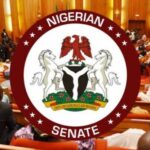The Chairman, House Committee on Pilgrims, Hon. Abubakar Hassan Nalaraba, has said that the National Assembly will support taxes on carbonated drinks.
He said this on Wednesday at a virtual stakeholder roundtable convened by the National Action on Sugar Reduction Coalition (NASR).
- World Diabetes Day: World Bank tasks FG on sugary drinks taxes
- PODCAST: What Happens To The Various Taxes Nigerians Pay?
Earlier this year, Hon. Nalaraba sponsored a motion presented before the National Assembly, calling for a tax on carbonated drinks and a ban on misleading packaging claims.
Speaking at the roundtable attended by economic experts from the World Bank and health
experts from the Nigerian Cancer Society, Hon. Nalaraba reaffirmed his support for the proposed
carbonated drinks tax.
“Parliament is ready to support and work very closely with the Coalition to ensure the tax is not removed from the Finance Bill,” Nalaraba said.
Reiterating the World Health Organizations’ (WHO) recommendations, World Bank Senior Specialist, Olumide Okunola said that no less than a 20 percent excise tax on all sugar-sweetened beverages will reduce their consumption.
He said that tax revenue should be remitted to the health sector to support health services delivery.
The NASR Coalition and its partners, comprising 16 health groups, had previously petitioned the Minister of Finance, Zainab Shamsuna Ahmed, in an open letter urging the government to
move forward with a proposed carbonated drinks tax.
The coalition commended the minister for her announcement of this “pro-health” tax, the organizations provided evidence from several geographies, including South Africa, where similar taxes have worked to reduce the consumption of carbonated drinks and other sugary beverages.
In the statement, the Coalition cited key outcomes from South Africa’s carbonated drinks tax,
known as the “health promotion levy”, which raises prices of beverages by taxing them
according to the amount of sugar the drink contains. Evidence shows that such an excise tax is
well-suited to address the harmful effects of sugary beverages and produce much-needed revenue.
They said, “One year after implementing its health-promotion levy, South Africa recorded a decrease in sugary beverage intake. Among high consumers, consumption decreased by up to seven times a week. Notably, with a tax equivalent to 15 US cents per gram of sugar, South Africa’s sugary beverage tax generated $140m in the first year.”

 Join Daily Trust WhatsApp Community For Quick Access To News and Happenings Around You.
Join Daily Trust WhatsApp Community For Quick Access To News and Happenings Around You.


